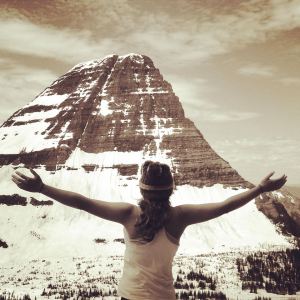There is something profoundly liberating, even magical, about traveling on a bicycle, and in many ways, my experience bike touring in Montana gave me ultimate mobility and an exceptional sense of independence that is so essential to the American spirit, to my spirit.

While I’m sure most fifteen-year-olds would argue that independence is a drivers license and a car, they have yet to grow tired of paying for fuel, oil changes, insurance, parking and parking tickets, and the hassle of dead batteries. At 23, I still see the value in driving a car to travel long distances and quickly get from place to place, but that sense of independence has long since diminished — along with the balance of my bank account. It starts to feel a lot less like independence when I think about the hours I need to work to cover all those expenses, and the recurring episodes of panic when I’ve been running on empty for 15 miles and the nearest gas station is another 25 miles down the road in the wrong direction.
On our long ride into Augusta, we stopped for water at a property with a sign in the yard that read, “Stay the f*ck out.” But the signage was misleading, and a man who lives there happily greeted we weary, thirsty bikers and led us to a water pump where we refilled our bottles. As we were getting back on the road, a couple pulled up to us in a shiny white sedan. Desperation in their voices, they asked where they could find the closest gas station. We were in the middle of nowhere, and there simply wasn’t a place to refuel. That was surely a stressful afternoon for those two, but I have to admit, we smiled (perhaps a bit too righteously) as we rolled away on our fossil-fuel-free vehicles.
In Augusta, we met with Hal Herring, a fiercely independent journalist and active member in the community. It was rodeo weekend and the 300-person town was overflowing with rowdy rodeo-goers from all over the West there for the “wildest one-day rodeo in the country.” Hal generously invited us to camp in the relative solitude of his backyard so that our tired bodies might actually rest, away from the ruckus at the campgrounds near downtown.
One of our conversations with Hal explored the concept of freedom. What does it mean to be free? To fight for freedom? Where do we draw the line when our individual freedoms are violated by the individual freedoms of our neighbors? How do we as citizens, and how does our government, defend our individual freedoms when, say, a single polluter profits and we all collectively bear the costs?
Conservatives have been much more effective at appealing to the fundamental desire to be free, employing powerful rhetoric to justify unfettered resource extraction and pollution and destruction of the natural systems on which our most basic liberties depend. But, if we give ourselves a moment to transcend the political polarization of climate change, and think of it not as a liberal or a conservative issue, but rather as a threat to many of our fundamental liberties, we can start to see eye-to-eye.
Most of us probably agree it’s worth fighting for our freedom to live in a stable climate and a stable economy that hinges on those natural systems, to ensure that our kids grow up free from the fear of resource wars and geopolitical instability.
– Alma Arteaga